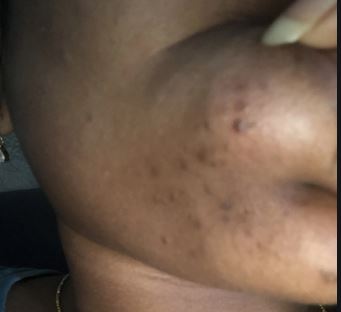
How to Remove Dark Spots Caused by Pimples
Published on March 16, 2021 at 10:49 AM by Face of Malawi
Living with acne can feel like riding a roller coaster. You finally clear up a breakout and you’re left with a dark spot or acne scar, but you’re unsure how to treat dark spots caused by pimples. Your initial instinct may be to try home remedies like lemon juice, aloe vera or reach for typical skincare with aggressive chemical peels and harsh exfoliating treatments, but here is the best way to diminish dark spots or these acne scars caused by pimples, step by step:
1. Be Gentle on New Dark Spots as the Skin is Still Healing
When the spot or acne mark is still red and the pimple has only just faded, your skin is very inflamed. This is no time to use any kind of over-the-counter product or acid, so if you typically use Salicylic Acid or Glycolic acid all over your face as a preventative acne treatment, avoid applying these products directly on the affected areas. Your skin is very tender and irritated, and is not ready to for application of exfoliating treatments. Instead, try Hydrocortisone. Using hydrocortisone for dark spots is an effective way to calm inflammation and address and soothe the red in your skin. It acts as a natural anti-inflammatory Apply this for only a period of few days, as over time, Hydrocortisone can actually thin the skin and make it more fragile.
2. Introduce Vitamin C Once the Blemish has Healed
When the dark marks or affected areas have completely healed and are no longer irritated, it’s time to bring in the antioxidants to help get rid of dark spots. Load up on Vitamin C, especially in the morning, to prevent excess melanin from depositing and making the spot darker. Ask your dermatologist to recommend the best Vitamin C-based skincare products.
3. Use a Retinoid for Brightening the Appearance of Dark Spots
Research skincare products or, again, consult your dermatologist to recommend items that include a retinol derivative that you can use at night to help speed up the regeneration of your skin. This will help push new, healthy, bright skin to the surface.
4. Exfoliate New Dark Spots with Acids
Once your skin has fully healed, you can use exfoliating treatments twice a week. Use a gentle, chemical exfoliant to help even out your skin tone and fade dark spots and discoloration caused by pimples. Mandelic Acid and Azelaic acid are especially good for hyperpigmentation or Melasma, a condition that causes brown spots on the skin.
5. Protect Dark Spots, Acne Scars and Melasma from the Sun
The most important step of all is to protect your acne scars from the sun. Do not start your day without sunscreen. An SPF of 30 or higher is recommended. UV rays do infiltrate windows in homes, offices and cars, so always wear SPF. Wear a wide-brimmed hat if you are going to be outside for an extended period of time. UV rays are the enemy of acne scars, dark spots and other skin conditions. They trigger inflammation and spike melanin production, causing your dark spots and scars to become even darker and harder to fade.
WHAT CAUSES ACNE MARKS OR DARK SPOTS LEFT BEHIND BY PIMPLES?
The technical word for the spot left behind an acne lesion once it heals is Post-Inflammatory Hyperpigmentation, or PIH. This type of pigment is different than normal dark spots because it is a result of inflammation. PIH is not specific to acne. These dark spots caused by pimples can also commonly occur as a result of razor bumps and ingrown hairs. PIH is most common in darker skin types, and can last for longer than 5 years if left untreated. Keep skin hydrated when shaving or washing your face. Not only are ingrown hairs and razor bumps painful, they will keep returning. Use shaving products to soften and hydrate skin and don’t rush the process. Cuts on skin also take a while to heal.
Prevent PIH Dark Spots from Forming
You may also get PIH if you pick at a blackhead or pimple. Picking at an active acne lesion or blackhead increases the likelihood of leaving behind a dark spot, which is one of the reasons why dermatologists and aestheticians caution against it. You’re better off leaving it alone and letting it heal over time, as painstaking as that can be or feel. Or, you can go to a professional like a dermatologist or licensed aesthetician to help remove it.
Relax and Stick to the Plan to Cure Dark Spots Fast
Whether you pick at your pimple or let it heal naturally, PIH may occur either way. It’s important to treat the inflammation and use antioxidants like Vitamin C to inhibit melanin production. Most importantly, use daily sun protection to prevent your spot from worsening. Even a well-healed spot can suddenly become dark if you spend too much time in the sun. We hope this post has helped inform you about how to cure dark spots caused by pimples, and how to prevent further dark spots forming.
Stick to a skincare regimen best suited to your skin.
Start a skincare routine beneficial to your specific skin type, issues and need.
Choose a cleanser, moisturizer with SPF, toner and night cream that will address what skin needs, so you can avoid pimples, dark spots and acne scars from starting. Do your research, listen to your skin…and to your dermatologist.
Subscribe to our Youtube Channel:


